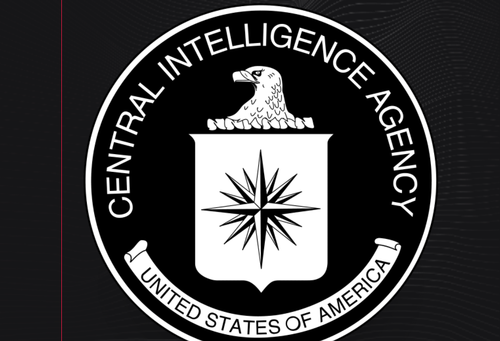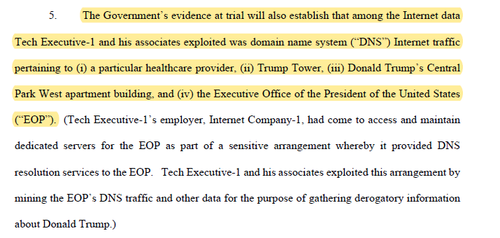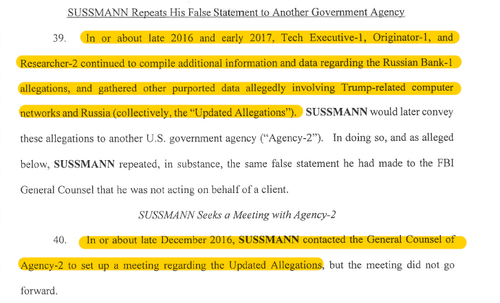Authored by Techno Fog via The Reactionary,
On Friday, Special Counsel John Durham filed a motion relating to a defense firm’s potential conflict of interest in the Michael Sussmann case. The conflict itself is certainly intriguing, with Sussmann’s lawyers at Latham & Watkins LLP (Latham) having represented potential witnesses in the case, including Perkins Coie, former Perkins Coie (and Clinton Campaign general counsel) Marc Elias, the Hillary Clinton Campaign, and Hillary for America.
The issue that made more noise, however, was Durham’s disclosure that Rodney Joffe – a contractor with deep ties to the Clintons, and what appears to be a deep hatred for Trump – had exploited Executive Office of the President of the United States data he obtained from a “sensitive arrangement” with the U.S. Government to damage President Trump. Here is our initial post on the topic.
And here is the talented Lee Smith providing a great explanation on Tucker:
.@LeeSmithDC says he keeps hearing people comparing the scandal to Watergate when it doesn’t compare to Watergate at all. We are talking about some of the most secure communications in government been Surveiled by political operatives. pic.twitter.com/f22h5V92vV
— The Dirty Truth (Josh) (@AKA_RealDirty) February 15, 2022
Yet the data from the Executive Office of the President wasn’t all that Joffe had obtained. He also collected domain name system (DNS) internet traffic pertaining to a healthcare provider; Trump Tower; and Trump’s Central Park West apartment building.
Yesterday, February 14, Sussmann’s attorney’s disputed the Durham filing – to an extent. They said Sussmann provided the CIA with Executive Office of the President data from “when Barack Obama was president.”
I have a theory about this.
If Sussmann’s attorney is telling the truth (never a given), then we suspect the Executive Office of the President data included that from the 74 day the Trump transition period (between the November 8, 2016 election and the January 20, 2017 inauguration) – which would still be spying on the incoming Trump Administration.
For background, the Executive Office of the President includes a number of Executive councils (National Security Council, Office of Management and Budget, etc.) that support the President. It is involved generally in the transition from one president to the next.
What about the data involved with the Trump transition? On August 1, 2016, Trump reached an agreement with the General Services Administration (GSA) “for telecommunication and internet technology services for both the pre- and post-election transition period.” This is the agreement. I wonder if Joffe’s company, Neustar, helped the GSA in the execution of that agreement. Maybe. Maybe not. I’m not sure it matters, as Neustar already had an agreement to provide “DNS resolution services” to the Office of the Executive of the President.
Regardless, the “transition theory”, if we can call it that, matches the timeline in the Sussmann indictment, which states that Joffe and his team continued to target “Trump-related computer networks” in late 2016 and early 2017. And it makes sense in context of Sussmann’s conduct, as Sussmann tried to put this information out there in late December 2016.
Anyway, back to the point of this post.
According to Durham, Joffe and his associates manipulated that data to make it seem like Trump, and those in Trump’s world, had suspicious interactions with internet protocol (IP) addresses affiliated with a Russian mobile phone provider. They then combined those allegations with the Alfa Bank hoax materials (the subject of Sussmann’s Fall 2016 meeting with then-FBI General Counsel James Baker).
This damaging information, purporting to demonstrate at least circumstantial evidence of Trump/Russia collusion, was presented on February 9, 2017 to what Durham describes as U.S. Government “Agency-2.”
That agency was the CIA. We know for sure that Sussmann met with the CIA General Counsel. We learned in January 2022 that, if Sussmann is to be believed, there were two other CIA employees at that meeting.
In other words, a Clinton supporting contractor (Joffe) obtained sensitive information (perhaps unlawfully) about the Office of the President of the United States (Trump), manipulated the information, passed it to a DNC/Clinton lawyer (Sussmann), who then delivered it to the CIA.
All on American soil.
This is important because the CIA is generally prohibited from conducting domestic operations. The FBI explains:
“The CIA collects information only regarding foreign countries and their citizens. Unlike the FBI, it is prohibited from collecting information regarding ‘U.S. Persons,’ a term that includes U.S. citizens, resident aliens, legal immigrants, and U.S. corporations, regardless of where they are located.”
In the CIA’s own words:
“The FBI is responsible for coordination of clandestine collection of foreign intelligence through human sources or human-enabled means and counterintelligence activities inside the United States.”
Yet when it came to Trump, here was the CIA doing what it is prohibited: “collecting information regarding U.S. persons” inside the United States. (See also the CIA’s bulk surveillance program.)
A top CIA official answered the call of a DNC lawyer who alleged that these suspicious internet “lookups” proved “that Trump and/or his associates were using supposedly rare, Russian-made wireless phones in the vicinity of the White House and other locations.” Accusations that were baseless, according to Durham.
In other words, the secret police was more than willing to accept politically damaging information against the President. I’m curious what they did with it. It seems naive to think the information stayed at the CIA. I bet it was passed onto the FBI or DOJ, who may have used it to further the Trump/Russia investigation.
The scandal we are seeing come to light just isn’t about Hillary and Joffe and Sussmann. It’s not limited to Fusion GPS, FISA abuse, or Igor Danchenko.
It’s also about the willingness of U.S. intelligence to target the President. And on that topic, the CIA has some serious questions to answer.
* * *
1. Democracy Forward Found. v. U.S. Gen. Servs. Admin., 393 F. Supp. 3d 45, 48 (D.D.C. 2019).
2. I can imagine the lazy pro-CIA rebuttals to this argument. They all ignore the dangers of CIA operations inside the U.S. and dismiss the jurisdiction of the various intelligence agencies. And let us be clear that CIA operations include collecting information.


